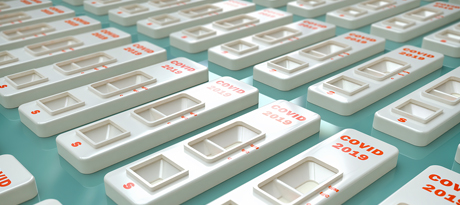
humonia / istock
With the notion that serology tests could help identify individuals with past COVID-19 infections and support community surveillance efforts, the U.S. Food and Drug Administration (FDA) first allowed serology tests for SARS-CoV-2 to come to market in March. Developers responded in droves.
The flood of tests prompted the agency on May 4 to update its EUA policies for COVID-19 antibody tests, requiring developers to submit their requests, along with their validation data, within 10 business days. FDA also set performance characteristics for approved tests, including 90% sensitivity and 95% specificity.
Cellex, a diagnostic and biopharmaceutical company in Research Triangle Park, North Carolina, was the first company to receive an EUA for a SARS-CoV-2 serology test, on April 1. This lateral flow immunoassay qualitatively detects and differentiates between SARS-CoV-2 IgM and IgG antibodies in serum, plasma or venipuncture whole blood specimens.
On the heels of Cellex’s EUA, on April 14 both Chembio Diagnostics and Ortho Clinical Diagnostics received EUAs for SARS-CoV-2 antibody tests. [Editor's note: On June 16, 2020 the FDA revoked Chembio's EUA due to performance concerns about the accuracy of its test.]
Chembio’s DPP COVID-19 System involves a finger stick test that detects IgM and IgG levels in 15 minutes. Sensitivity and specificity is at 95% and 96%-97% respectively. “That’s extremely good performance for a point-of-care test,” Gail Page, a member of Chembio’s board of directors, told CLN Stat. The test runs on Chembio’s Micro Reader 1 and Micro Reader 2 analyzers. “We were able to get this test to market swiftly because we used a platform that’s already been on the market, and has been demonstrated to work. One platform is about the size of a book; the other’s like a Rubik’s Cube on steroids,” Page noted.
The fingerstick test involves a drop of blood on a device well. The read time is only 15 seconds. Even though batches are small, there’s a high throughput with this system, which can be used to monitor patients and immune status. Hospitals could use these tests for patients that need surgery, Page said. Eventually, the test could be used in doctor’s offices, clinics, emergency departments and other facilities where there’s a need for more decentralized testing.
The test may also prove useful in patients with comorbidities, the elderly and those who aren’t good candidates for venipuncture, Page suggested.
The company recently produced and shipped out its first lots of the assay, with plans to ramp up shipments in the United States and other countries. The test is also available as a venous blood test.
Known for its infectious diseases assays, Ortho Clinical Diagnostics has received EUAs for two SARS-CoV-2 antibody tests. Labs can easily adapt to this new technology, as it reflects other similar Ortho tests already in operation, Chockalingam “Palani” Palaniappan, Ortho’s chief innovation officer, told CLN Stat.
The company first received an EUA for the VITROS® Immunodiagnostic Products Anti-SARS-CoV-2 Total Reagent Pack, which detects all three antibodies to SARS-CoV-2, IgM, IgG, and IgA, Palaniappan said. It runs on the VITROS® XT 7600 Integrated System, the VITROS® 3600 Immunodiagnostic System, the VITROS® 5600 Integrated System and VITROS® ECi/ECiQ Immunodiagnostic Systems, which operate in about 1,000 hospitals in the U.S., according to Palaniappan. These instruments are capable of processing about 150 SARS-CoV-2 tests an hour and 3,500 per day, making total daily throughput nationwide of 3.5 million tests, he added. Palaniappan expected about 10 million to 20 million of these tests to be available in May.
On April 25 Ortho received an EUA for a second antibody test that just measures IgG. The test works on the same ELISA principles as the COVID-19 total antibody test and also uses the VITROS platform.
Both Ortho tests also received the CE mark in May, and the company on May 11 announced a partnership with Quest Diagnostics to expand access to COVID-19 antibody testing.
As of May 19 FDA has authorized 103 tests under EUAs, including 90 molecular tests, 12 antibody tests, and 1 antigen test.